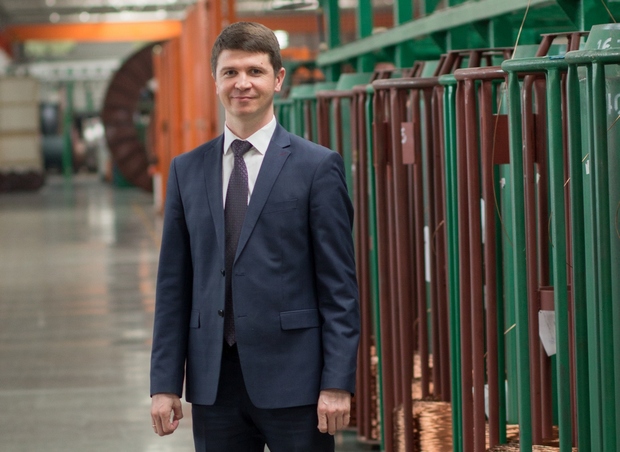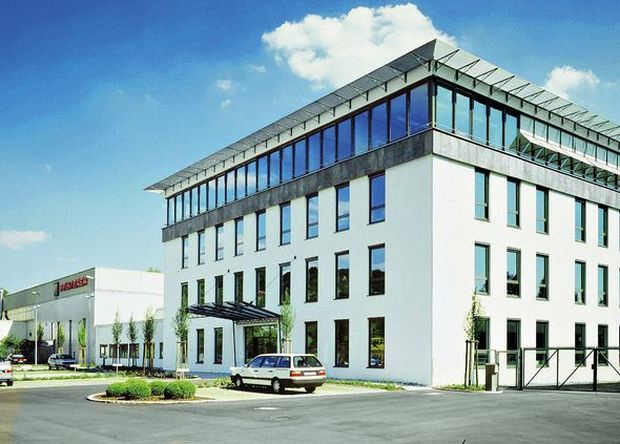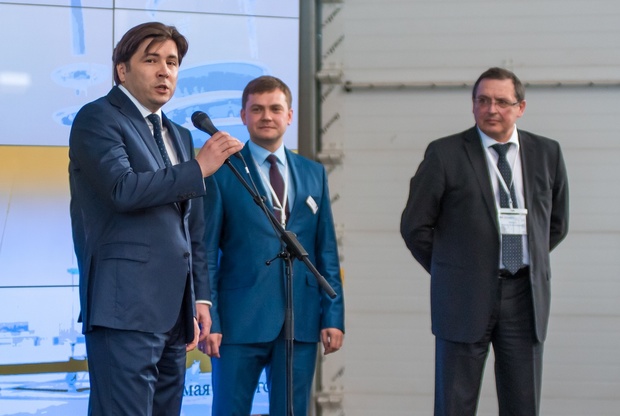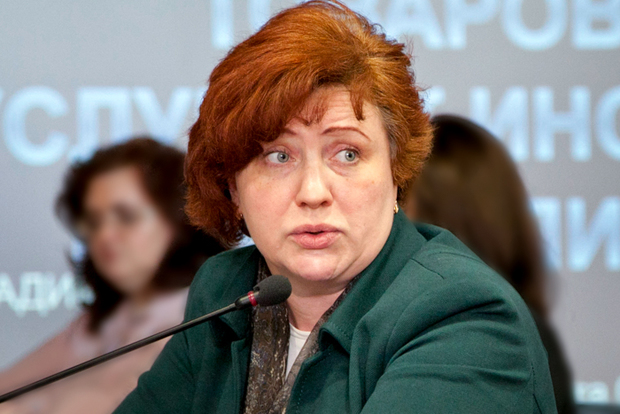Millions of euros break the union of German and Tatarstan cable manufacturers
What is behind the scandalous move of Pfisterer from INVENT technopark to Khimgrad in Kazan
INVENT Group of Companies that is among the biggest cable manufacturers of the country left the joint project it had with Pfisterer (Germany). Initially, the partners were going to localise production of all types of cable accessories under the German brand in Tatarstan. INVEST was likely to cut relations due to a failed attempt to obtain a European licence and control in the joint venture where the Germans got 60% and agreed to transfer the right to use the trademark only in royalties. Representatives of Pfisterer Rus talked to Tatarstan President Rustam Minnikhanov and Prime Minister Aleksey Pesoshin. Realnoe Vremya's reporter examined the conflict.
Tatcable lacked connection
Actually, the dissolved business union of INVENT and Pfisterer could have been a perfect couple: the first one has rich production of power cables for different voltage levels but doesn't have fastening couplings to connect cable systems, the second one is famous worldwide as cable accessories maker but doesn't have its own cable. ''Pfisterer is one of the few companies in the world that doesn't have its own high-voltage cable production. This is why it was important for it to remain in the cable market of Russia,'' Director General of Elektrokabel Association Non-commercial Partnership Natalia Sakharova notes. ''There is a handful of analogous companies like Pfisterer, Tyco Electronics, G&W.'' Having united in Pfisterer RUS joint venture, the partners harmoniously complemented each other, so to speak, by creating great opportunities to enrich each partners' business. Judging by these rosy observations, at the end of 2014, INVENT CJSC and German Pfisterer Holding AG entered into a ''marriage of convenience'' having agreed to open a joint venture to produce all the range of couplings for cable lines from 110 to 330 kW (in addition, the production licence was granted by Pfisterer for 550 kW).
This project immediately received an international outcry because its creation was preceded by the signing of a memorandum of understanding aimed at cooperation in the sphere of high and extra-high voltage cable lines. This event took place at CIGRE 2014 technical exhibition in Paris in August 2014. The ceremony was held together with high-profile federal functionaries. Deputy Minister of Energy of Russian Vyacheslav Kravchenko, Director General of Rosseti CJSC Oleg Budarin, Chairman of the Board of Federal Grid Company of Unified Energy System Andrey Murov were at the signing from the Russian side. Representative of INVENT CJSC Radik Motygullin and member of the board Pfisterer Holding AG Jörg Fries put their signatures to the document. The very joint venture appeared in late 2014 when in Moscow the sides signed an agreement on creation of a joint enterprise that was located in INVENT technopark where the main production capacities of the company are concentrated.
Opening of the new production division in the structure of INVENT, which is one of the major players in the country's construction market, noticeably strengthened its competitiveness. It is enough to say that INVENT-Technostroy is the subcontractor in reconstructed facilities of Luzhniki arena and other big federal venues.
''While signing an agreement on delivery of cable products with the energy facility's contractor, the second agreement is obligatorily signed – on supervision of cable laying,'' Senior Engineer of the factory Fanil Dinmukhametov (Editor's Note: currently Executive Director of Tatcable) told earlier in an interview to Top Builder. ''Without it the factory-manufacturer doesn't grant a guarantee to use it along the manufactured length excluding connection sections. Supervising for several years, we saw that a numerous army of contractors and suppliers of different positions constructed the energy facilities: somebody delivers cable, somebody brings cable accessories, while the very contracting company that lays the cable and assembles couplings doesn't have enough skills to work with the expensive cable from tailored polyethylene and even can damage it. This is why we work on a turnkey basis. As a result of the creation of the joint venture, we will be able to reduce delivery terms of this product to the construction sites and, consequently, increase the launch of the facilities.''

INVENT interrupted a €3m emission
However, in reality, fulfilment of the project stalled. After 1,5 years of unsuccessful negotiations on investments in the company's development, Pfisterer Rus CJSC had to leave the energy technopolis, and INVENT withdrew from the group of founders of this company. Although all the main conditions were written in the agreement on creation of the joint venture and execution of the participants' rights, especially conditions and financial commitments.
''We had disagreements with Pfisterer Holding AG and its subsidiary Pfisterer Rus CJSC while creating the project, which are solved in court now,'' Director of the Public Affairs Department of INVENT GC Maria Stankevich told Realnoe Vremya. ''In accordance with the conditions of contracts, the sides don't have the right to divulge details of the agreed relationship and details of the debates as a result.''
The Germany company accuses the Tatarstan partners of breaking the joint venture. As German representatives assure the latter interrupted the payment within the first additional issue of €3 million and decided to leave the project after imposition of corporate sanctions against it. The debate was so dramatic that Pfisterer Rus even had to call a crane to take production equipment. The crane transferred vehicles and equipment behind the fence and loaded them on trucks that were waiting for them. The trucks took everything to Kazan. So the Germans left the family seat of INVENT. Although the project had excellent prerequisites to become profitable due to localisation, planned export of part of products, synergy of cable system's sale and growth of the currency rate of the western accessories, it failed at the beginning of the road. Why?
Pfisterer Holding AG reserved the control
At first, distribution of shares was in favour of Pfisterer Holding AG by mutual agreement: it had 60% of the authorised capital and INVENT CJSC – 40%. At the initial stage, the authorised capital totalled 8 million rubles, that's to say, the Germans paid 4,2 million rubles and the Tatarstan partners – 3,2 million rubles. In the signed agreement, the sides immediately agreed to perform emissions stage by stage to increase the capital: the first one at over €3 million and the second — €2 million, both in rubles. So more than €5 million in rubles were going to be invested in the future factory.

What is more, as far as we know, the sides agreed that the property (the building and the land) as well as the licence won't be added to the authorised capital but be leased to the joint venture (Editor's Note: in royalties). The main licensed payment was to be made after the first increase of the authorised capital. Its size was fixed at €490,000 within the partnership with INVENT CJSC and like a gesture of goodwill and seriousness of intentions, which is considerably lower than market price (for instance, for up to 220 kW licence, G&W that INVENT tried to create an analogous joint project with paid over €1 million). In addition, the production technology and purchased equipment were already obsolete when INVENT CJSC bought them.
In search of presidential protection
In conclusion of the conflict, the Germans wrote Tatarstan President Rustam Minnikhanov and Prime Minister Aleksey Pesoshin a letter. In the letter (the text is at Realnoe Vremya's disposition), director of Pfisterer Rus Ellada Ismaylova noted that ''the first growth of the authorised capital was almost interrupted because of INVENT'' that did not manage to deliver the equipment and pay the money completely, while Pfisterer made of all its commitments at more than 85% of the established deposit price and INVENT – only 8% of the fixed price of its deposit.''
After INVENT CJSC told it was not ready to participate in the first emission, Pfisterer stopped the delivery of remaining equipment (about 15%). ''Relations between the participants of the association worsened when the first increase of the authorised failed because of INVENT,'' Ismaylova notes in the letter. According to the conditions of the agreement, sanctions (fines) are imposed for dereliction of duties to increase the authorised capital. But Pfisterer offered to increase fines in favour of the association and send them to develop the local production and business.
The partners tried to regulate the conflict in Moscow in INVENT's office. ''During the meetings, Elbek Safaev (Editor's Note: currently chairman of the board of director of INVENT GC) confirmed the loyalty to the conditions of the corporate agreement and readiness to look for solutions many times, including the readiness to accept an option offered by Pfisterer,'' Ismaylova says. ''Pfisterer representatives offered to grant INVENT a loan or unilateral financing of the association (increase of the authorised capital of the Association by additional deposit of Pfisterer and signing of the option agreement for INVENT CJSC to purchase the share of its 40 (forty) % in the next years on preferential terms)''. Then it was offered to hold the next meeting in Germany in January 2016. Then Mr Safaev confirmed the readiness of INVENT to participate in this meeting and accept the option. ''However, the protocol of the meeting was not signed in the end. And representatives INVENT CJSC did not appear at the meeting in January without explaining the reasons. But Pfisterer Rus was who got the first legal claim from INVENT CJSC.
Accepting the partnership with INVENT, Pfisterer Rus counted on secure sales channels and promotion of the cable system, but it was wrong. As Ellada Ismaylova writes in the letter to the Tatarstan president, ''the Tatarstan partner INVENT and affiliated Tatcable did not make commitments to organise market promotion of products in projects and purchase of Pfisterer cable accessories preferring to work with rival companies.''
Only one project was fulfilled together with INVENT – delivery of products on the 330 KW Pulkovo-Yuzhnaya in Saint Petersburg,'' she notes.

Burnt bridges?
Despite the direct letter to the president, Pfisterer Rus CJSC is ready to recover the relations. Now Pfisterer Rus is a 100% subsidiary of Pfisterer Holding AG, and the factory moved to Khimgrad technopark in Kazan. ''At a meeting in Moscow, Pfisterer stressed its readiness for cooperation and made corresponding proposals many times to particularly Tatcable CJSC to create a 550 kW cable system and participate in projects together,'' Ellada Ismaylova answered Realnoe Vremya. According to her, the company intends to continue working in Tatarstan. ''In the last months, we have received several offers of joint work and expansion of the project of localisation and strategic cooperation,'' she said. Realnoe Vremya's reporter asked officials of INVENT the analogous question. But the answer has not been received. Now difficult divorce proceedings are taking place between the former business partners accompanied with mutual requirements for compensation. It is enough to say that 9 actions taken against each other at millions of rubles are in the court of arbitration.
Licence needs to be transferred…
Commenting on the break in relations between the two companies, Natalia Sakharova, director general of Elektrokabel Association Non-commercial Partnership, notes that Pfisterer's obvious goal was to remain in the Russian cable accessories market and provide partnership high-voltage cable production. ''Creation of a joint venture certainly needs to be accompanied by a transfer of the licence to both the right to use the trademark and registered know-how. Otherwise, a quick entrance to the market with localised products is not possible – a longer term of new product development is needed as well as a cycle of long (over one year) certifying trials,'' Sakhariva thinks.

As for the share of Pfisterer products supplied from Switzerland and Germany in the high-voltage cable accessories market of Russia, it can be at 10-12%. The fall in the ruble rate and imposition of sanctions insignificantly affected the import of high-voltage cable accessories, and the import mainly reduced because of a smaller number of investment projects in the country.
''Arkasil (Moscow) has quite successful experience in localisation of cable accessories production in Russia to create its own factory. This company has been successfully making and selling both 110-220 kW cable and cable accessories for 5 years. There are other Russian companies that nowadays create their own factories manufacturing high-voltage accessories,'' the director general of Elektrokabel association puts an example.